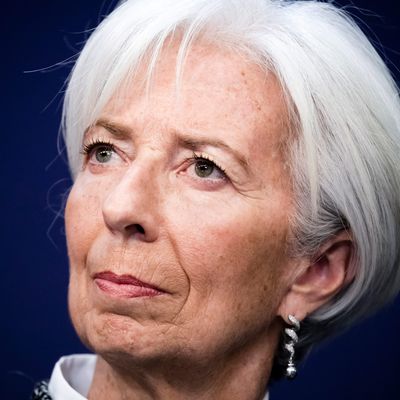
Last October, the International Monetary Fund released a paper arguing that inequality was undermining global economic growth — and thus, contrary to supply-side dogma, developed nations did not need to choose between progressive tax policies and growth-enhancing ones.
The United States could raise taxes on its wealthiest citizens and accelerate the growth of its GDP, simultaneously. On the other hand, were advanced economies to cut taxes on their rich — and consequently, shift the burden of taxation on to ordinary citizens, or cut public investment — they would risk reducing global growth.
But Donald Trump didn’t put much stock in the advice of these globalist elites. And so, the “populist” president pushed through his giant tax giveaway to America’s corporations and superrich.
Nonetheless, the IMF isn’t done sounding the alarm about the baleful implications of Trump’s tax policies. As Bloomberg reports:
IMF Managing Director Christine Lagarde said the Trump administration’s $1.5 trillion tax cut could prompt other nations to follow suit, fueling a “race to the bottom” that risks hemming in public spending.
…“What we are beginning to see already and what is of concern is the beginning of a race to the bottom, where many other policy makers around the world are saying: ‘Well, if you’re going to cut tax and you’re going to have sweet deals with your corporates, I’m going to do the same thing,”’ Lagarde said.
…“You need public money,” she said. “The race to the bottom is not conducive to those investments and to helping prepare the workforce and our societies for this new economy of tomorrow.”
In other words: The IMF is worried the Trump tax cuts will strengthen the hand of the global capitalist class, and condemn the workers of the world to an even more exploitative form of late neoliberalism.
All right — I may be reading Lagarde’s statement through red-colored glasses. But the dispute between the IMF and Trump administration points to an oft-overlooked irony in contemporary politics. In popular discourse, populism is associated with nationalism, and elitism with “globalism.” And not without reason: Generally speaking, in most democracies, the public has an easier time influencing policy at the national level than at the global one. National governments are more sensitive to popular sentiment than democratically unaccountable, international organizations like, say, the IMF.
And yet, populism in its ideal form — which is to say, a politics that privileges the wants and needs of ordinary people — is impossible in the modern world absent international cooperation and institutions of global governance. Nationalist movements that restrict the mobility of labor across borders — but let capital traverse the planet at will — pose no threat to the “global power structure” that (in Trump’s words) “robbed our working class.” And that is, of course, even more true of nationalist movements that slash corporate tax rates.
So long as the cosmopolitan Über-elite can force nations to bid against each other for access to their capital, the power of any national public to exercise genuine self-rule will be limited. Right now, 10 percent of the world’s gross domestic product is hidden in tax havens. There is no way for any country to claw back its share of that wealth — or prevent their superrich from further shifting the burden of taxation onto the middle class through tax evasion — without international action to sanction tax havens, and keep track of the ownership of all the world’s financial assets.
In conclusion: Globalism is the new populism. IMF… welcome to the Resistance.






























